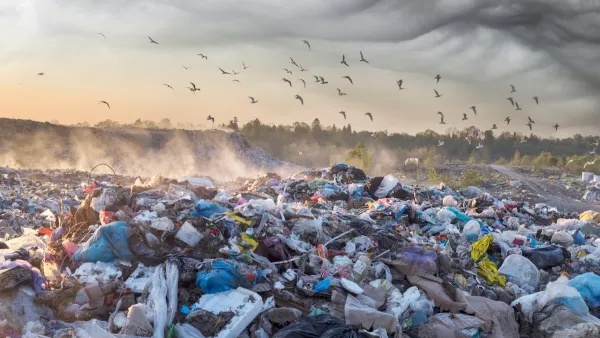In the mountains surrounding L.A. stand some of the most advanced environment analyzing technology in the U.S. The result of this analysis could be "a groundbreaking development in the worldwide fight against global warming."
"Scientists from NASA’s Jet Propulsion Laboratory in Pasadena, Calif., and elsewhere are turning the entire Los Angeles metro region into a state-of-the-art climate laboratory," reports John Metcalfe. "From the ridgeline [of Mount Wilson], they deploy a mechanical lung that senses airborne chemicals and a unique sunbeam analyzer that scans the skies over the Los Angeles Basin. At a sister site at the California Institute of Technology (Caltech), researchers slice the clouds with a shimmering green laser, trap air samples in glass flasks, and stare at the sun with a massive mirrored contraption that looks like God’s own microscope."
"These folks are the foot soldiers in an ambitious, interagency initiative called the Megacities Carbon Project. They’ve been probing L.A.’s airspace for more than a year, with the help of big-name sponsors like the National Institute of Standards and Technology, the Keck Institute for Space Studies, and the California Air Resources Board. If all goes well, by 2015 the Megacities crew and colleagues working on smaller cities such as Indianapolis and Boston will have pinned down a slippery piece of climate science: an empirical measurement of a city’s carbon footprint."
"The goal is to one day have a comprehensive network for sensing greenhouse gases in all the major cities across America or even the world. With that in place, an obvious application would be capping sources of fugitive emissions. An eagle-eyed satellite might detect roiling leaks in natural-gas pipes caused by aging infrastructure, or disasters like hurricanes and earthquakes. Then cities could prioritize repair crews accordingly."
FULL STORY: How NASA Scientists Are Turning L.A. Into One Big Climate-Change Lab

Maui's Vacation Rental Debate Turns Ugly
Verbal attacks, misinformation campaigns and fistfights plague a high-stakes debate to convert thousands of vacation rentals into long-term housing.

Planetizen Federal Action Tracker
A weekly monitor of how Trump’s orders and actions are impacting planners and planning in America.

Chicago’s Ghost Rails
Just beneath the surface of the modern city lie the remnants of its expansive early 20th-century streetcar system.

Bend, Oregon Zoning Reforms Prioritize Small-Scale Housing
The city altered its zoning code to allow multi-family housing and eliminated parking mandates citywide.

Amtrak Cutting Jobs, Funding to High-Speed Rail
The agency plans to cut 10 percent of its workforce and has confirmed it will not fund new high-speed rail projects.

LA Denies Basic Services to Unhoused Residents
The city has repeatedly failed to respond to requests for trash pickup at encampment sites, and eliminated a program that provided mobile showers and toilets.
Urban Design for Planners 1: Software Tools
This six-course series explores essential urban design concepts using open source software and equips planners with the tools they need to participate fully in the urban design process.
Planning for Universal Design
Learn the tools for implementing Universal Design in planning regulations.
planning NEXT
Appalachian Highlands Housing Partners
Mpact (founded as Rail~Volution)
City of Camden Redevelopment Agency
City of Astoria
City of Portland
City of Laramie




























